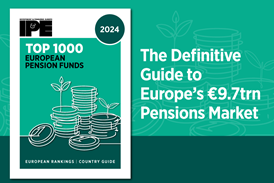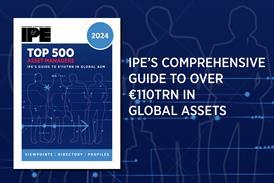All Opinion Pieces articles – Page 12
-
 Opinion Pieces
Opinion PiecesAustralia: Supers face A$500m tax hit
In the lead-up to the first budget by a Labor government in 12 years, speculation was rife about what the new Australian government might have in store for the superannuation sector.
-
 Opinion Pieces
Opinion PiecesCOP27: more questions than answers but reasons to hope
Despite the cynicism around COP27 last month, there were some potentially major developments for investors. Excitingly, a number of them address what’s often ignored in climate finance discussions: moving money.
-
 Opinion Pieces
Opinion PiecesViewpoint: Asset allocation – factoring inflation
As inflation keeps beating records, real incomes remain under pressure and the standard approaches to diversification are challenged
-
 Opinion Pieces
Opinion PiecesViewpoint: COP27 needs to have the water crisis at its heart
Measuring and disclosing risks, opportunities and impacts of economic activities is critical to support the transition to a sustainable economy
-
 Opinion Pieces
Opinion PiecesViewpoint: Dutch pension funds should consider the costs of convexity
Pension funds should consider adjusting their hedging policy as convexity doesn’t seem to payoff anymore
-
 Opinion Pieces
Opinion PiecesViewpoint: ESMA’s latest shot at ‘pre-hedging’ must now bring a clear set of rules
With a direct and significant impact on the prices that pension and other funds receive for the securities they buy and sell, pre-hedging is a key market cleanliness issue with broad implications for the investment industry, but also the end-investor and the public at large. It should not be overlooked this time around for it could become a LIBOR moment for market confidence.
-
 Opinion Pieces
Opinion PiecesNext up for Switzerland: second pillar reform?
The narrow majority of Swiss citizens voting to reform the country’s statutory (AHV) pension system in a referendum on 23 September (52.2%) could create momentum to bring about changes to the second pillar.
-
 Opinion Pieces
Opinion PiecesAn uncertain outlook for UK pension journey plans
Following the Bank of England’s (BoE) emergency intervention announced on 28 September to stem the sell-off of long-dated UK government bonds, UK defined benefit (DB) pension funds were kept busy, as falling Gilt prices over the past weeks caused mark-to-market losses in liability-driven investment (LDI) strategies.
-
 Opinion Pieces
Opinion PiecesLessons on LDI: learn from the Dutch cultural revolution
Around 20 years ago, UK occupational pension liabilities underwent a structural change. With assets weighted towards UK equities, still cashflow positive and open to new members and future accrual, liabilities were not too greatly discussed.
-
 Opinion Pieces
Opinion PiecesGuest viewpoint: Diversification and dislocation in a place called dystopia
What happened to my free lunch? They told me that diversification was there for the taking, yet there has been no zig to my zag. They promised me downside protection, but all I see is red. They said liquidity was a benefit, but never mentioned the bid/ask spread. Welcome to dystopia in the era of dislocation.
-
 Opinion Pieces
Opinion PiecesThe biggest test for private credit is upon us
Non-listed asset classes are sometimes touted as the weatherproof investment that can deliver positive returns no matter what, in both strong and weak economic environments.
-
 Opinion Pieces
Opinion PiecesAustralia: Super funds shift focus to private credit
An ambition of the architects of Australia’s universal superannuation system, when it was set up in 1992, was to create what would become a fifth pillar of the nation’s banking system.
-
 Opinion Pieces
Opinion PiecesUS: Pension plans face up to a tough 2022
After the terrible returns of the fiscal year that ended in June, what will US public pension funds do? Will they increase their risky investments to try to reach their target returns? Or will they lower their target returns?
-

-
 Opinion Pieces
Opinion PiecesViewpoint: Consolidation in UK pensions market – what are the options?
Will there be an increase in pension scheme consolidation in the UK market and will it lead to increased investment in alternative ESG assets? Consolidation could provide the collateral to invest in greater ESG assets.
-
 Opinion Pieces
Opinion PiecesViewpoint: Ageing demographics challenge Germany’s PAYG state pension system
Germany has a well-established occupational pension system, but participation among employees is only about 50% overall, and in the significant SME segment only 30%
-
 Opinion Pieces
Opinion PiecesESG Viewpoint: The genius of SFDR - requiring ordinal disclosure is so much more than a label
When the EU originally announced its High-Level Action Plan for Sustainable Growth in 2018, its intended eco-label received a lot of attention. Many considered the Sustainable Finance Disclosure Regulation (SFDR) a boring, administrative matter. Labels are shiny commonplace symbols hyped by corporate marketing teams around the world to instil a feel-good factor in retail consumers and bolster the defensibility of institutional buyer decision making. Required Ordinal Disclosure (ROD) is a technocratic idea whose genius has remained largely unrecognised to date.
-
 Opinion Pieces
Opinion PiecesUS: Transparency concerns over SEC private market disclosure rules
Will the US Securities and Exchange Commission’s (SEC’s) new climate risk reporting rules bring more transparency to private markets? Or will they have the unintended consequences of increasing the opacity of the markets?
-
 Opinion Pieces
Opinion PiecesSolvency II: Rule changes can’t force risk taking
Changing the rules can often seem like a very sensible policy choice – whether a sweeping deregulatory reform or more of a technocratic adjustment to regulations.
-
 Opinion Pieces
Opinion PiecesGuest viewpoint: Let’s make ESG real, and call out the fakes
Environmental, social and governance (ESG) investing has become pretty much mainstream. At its ideological base is the belief that a capitalist economy and polity that seeks the well-being of its middle class can achieve positive change by mobilising investment flows – in particular, that environmental protection and social justice can come about by correcting where investments are channelled.





